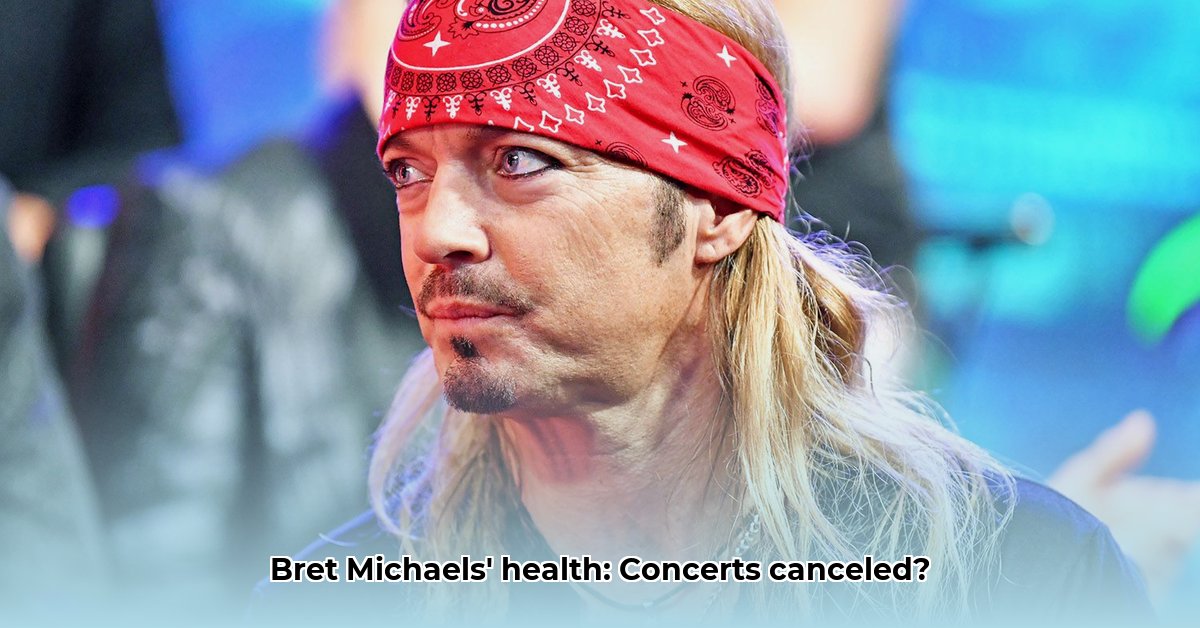Bret Michaels, the high-energy rocker celebrated for his performances, has recently faced a series of concert cancellations, causing concern among his dedicated fanbase. This article explores the underlying factors, the reasons behind these postponements, and the broader implications for Michaels, concert organizers, and his devoted followers. We will delve into the health issues at play, the complexities of rescheduling, and the potential future of Bret’s touring career, as well as exploring concert schedule challenges.
Bret Michaels’ Concert Schedule & Health Challenges – A Closer Look
Bret Michaels, renowned for his electrifying shows with Poison and as a solo artist, encountered a major setback in 2023 and 2024 with multiple concert cancellations. This wasn’t just a one-off event; it became a pattern affecting both his solo engagements and appearances with his band. The primary cause was a complex set of health-related issues, impacting both solo performances and band appearances, requiring a comprehensive understanding of musician health concerns.
Decoding the Health Factor: Beyond a Simple Illness
Michaels’ public struggle with Type 1 diabetes took center stage. While he has openly managed this condition since childhood diagnosis at age six, its impact on his touring consistency became increasingly clear. News reports often vaguely mentioned “illness” or “medical complications,” but the root cause was frequently linked to his diabetes and associated challenges. Severe dehydration related to blood sugar management and adverse reactions to medication often forced postponements, making these concert postponements a reoccurring concern.
Maintaining peak performance while managing a serious, lifelong medical condition is a delicate balancing act. The potential for dangerous complications demands careful planning and monitoring, highlighting the need for diabetes management strategies. He has also publicly addressed kidney issues, a brain hemorrhage in 2010, and skin cancer, further complicating his ability to maintain a consistent tour schedule.
The Ripple Effect on the Music Industry and Concert Promoters
These cancellations triggered a chain reaction extending beyond disappointed fans. Concert promoters faced logistical nightmares, struggling to manage refunds and reschedule events. Venues experienced revenue losses, disrupting carefully planned schedules and raising questions about live music industry challenges. Insurance companies also face increased scrutiny and potential payouts related to cancellation policies.
The disappointment of fans is hard to overstate. Tickets, travel arrangements, and anticipation were all abruptly dashed, resulting in a collective loss of a shared experience, emphasizing the importance of fan disappointment management. The impact is felt most acutely by those who have followed Michaels’ career for decades, viewing his concerts as more than just entertainment but as a connection to their youth.
Solutions for Musicians and the Music Industry
Addressing this situation involves a multifaceted approach for Bret, concert promoters, and his fanbase. How can future disruptions be minimized? Several strategies deserve consideration. Flexible tour schedules that accommodate potential postponements, and increased investment in healthcare resources for performing artists, are vital. It’s about creating a sustainable model for artists with chronic health issues alongside addressing tour schedule solutions.
This also includes proactive health management programs, encompassing direct medical support. There need to be systems in place to help performers manage the demands of rigorous tour schedules and maintain artist health support. Telemedicine options could also provide valuable remote monitoring and support, reducing the need for in-person doctor visits while on the road.
| Stakeholder | Immediate Responses | Long-Term Strategies & Considerations |
|---|---|---|
| Bret Michaels | Prioritize complete rest and recovery; work closely with medical team | Develop a more sustainable touring approach; incorporate regular health checkups, adjust performance intensity; consider shorter sets or more frequent breaks. |
| Concert Promoters | Improve communication with fans; establish clear cancellation policies; develop robust emergency plans | Invest in comprehensive artist insurance; build flexibility into contracts; create stronger partnerships with medical professionals; explore alternative dates and venues. |
| Fans | Remain understanding; check tour dates regularly for updates | Consider flexible ticketing options; support the artist through the challenges; explore fan forums to share experiences and offer encouragement. |
These cancellations underscore the vulnerabilities in the demanding world of live performance. Even iconic artists face real health challenges. It’s an opportunity to better support those who bring us joy, ensuring their well-being while preserving live music by promoting musician well-being initiatives. Ongoing research into managing diabetes and its impact on performers is crucial for finding long-term solutions with a focus on chronic illness in entertainment. Furthermore, there needs to be open dialogue within the music industry about the pressures artists face to maintain grueling schedules, potentially exacerbating health issues.
Type 1 Diabetes and Touring: Impact on Musicians’ Concert Schedules
The iconic rocker, Bret Michaels, personifies the real-world challenges of how type 1 diabetes affects touring musicians’ concert schedules. His career showcases the unpredictable nature of managing a chronic illness while adhering to a demanding performance schedule. His experience also highlights the broader need for greater awareness and support for musicians managing chronic health conditions.
Walking the Tightrope: Blood Sugar and the Stage
Touring life is famously tough. Irregular sleep patterns, unpredictable meal times, and the physical demands of performing can all wreak havoc on blood sugar levels. For musicians like Michaels, maintaining stable blood sugar becomes a constant challenge. Each skipped meal, intense performance, and stressful situation presents a risk, potentially leading to concert cancellations, highlighting the challenges of touring with diabetes. It is a fine example of diabetes management techniques to consider.
These are not just missed performances; they are serious disruptions to planned tours, affecting revenue, fan expectations, and the artist’s mental well-being. Performing flawlessly while managing a potentially life-threatening condition is immensely stressful, requiring meticulous concert planning adjustments. The adrenaline rush of performing can also impact blood sugar levels, creating further instability.
The Impact of Unforeseen Events
Hypoglycemic or hyperglycemic episodes can occur at any time, despite careful planning. This unpredictability is a major challenge with blood sugar management while touring. Factors such as changes in altitude, weather conditions, and even the intensity of stage lighting can influence blood sugar. While technology like continuous glucose monitors (CGMs) and insulin regimens help, unexpected fluctuations can still happen needing hypoglycemic awareness.
Imagine navigating a shifting minefield. Advanced tools help, but the terrain changes, forcing immediate stops due to dangerous blood sugar drops during tour schedules, reflecting the unpredictability of diabetes. Diet and exercise routines are disrupted by travel, which adds more risk to future performances.
Ripple Effect: Concert Cancellations and Consequences
Health-related concert cancellations have far-reaching consequences. Venues lose revenue, fans are disappointed, and support staff faces uncertainty. The artist, too, experiences setbacks. Rescheduling and managing communications increases pressure, highlighting the financial implication of cancellations. Negative publicity surrounding cancellations can also impact an artist’s reputation and future booking opportunities.
The financial burden for the artist and team can be substantial, involving refunds, lost ticket sales, and legal issues stemming from the logistical challenges of rescheduling. There are also hidden costs associated with having medical personnel on standby and the potential need for emergency transportation.
Technology and Adaptability
Advances in diabetes management are continuously improving. CGMs provide real-time glucose data, helping to avoid dangerous episodes. Insulin pumps deliver precise doses of insulin, reducing the need for frequent injections. Proactive self-management is paramount, and adopting diabetes technology for musicians is key. Smartwatches can also be integrated to remind musicians to test blood sugar levels.
Musicians adapt routines, incorporating self-care into schedules. Frequent blood glucose checks, strategic meal planning, and mobile workout facilities are essential, showcasing creativity and determination. The need for self-care strategies for musicians becomes vital. Some artists even create “diabetes riders” in their contracts, outlining specific requirements for meals,休息, and medical access.
Managing Mental Health
The mental and emotional toll on musicians with type 1 diabetes should not be underestimated with mental health for touring musicians. Constant vigilance, risk, and unforeseen events can lead to stress, anxiety, and burnout. The mental burden of managing this condition while maintaining an artistic life is significant and can impact concert schedules. Support groups and therapy can provide valuable coping mechanisms. The psychological impact of diabetes is a critical factor to consider.
Key Takeaways:
- Type 1 diabetes introduces significant uncertainty into a touring musician’s concert schedule.
- Concert cancellations due to diabetic emergencies create financial and logistical problems for all involved.
- Technological advancements in diabetes management offer strategies, but proactive self-care remains crucial, reflecting the importance of proactive healthcare.
- A relentless management plan encompassing diet, exercise, medication, and technology is key to mitigating risk.
- The mental and emotional burden of living with this condition while pursuing a demanding artistic life is significant. Recognizing this emotional impact will help create a healthier working environment.
Today.com: Bret Michaels ends concert early after suffering diabetic emergency
- Discover Affordable Singing Lessons Near Me to Unlock Your Potential - February 24, 2026
- Affordable Vocal Lessons Bring Professional Singing Guidance Within Reach - February 23, 2026
- Local Vocal Lessons Offer Expert Guidance for Every Singer - February 22, 2026










